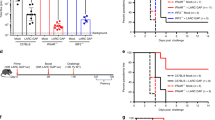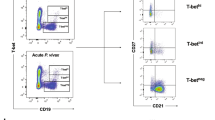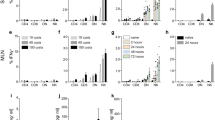Abstract
CD4+ T cells are crucial to the development of CD8+ T cell responses against hepatocytes infected with malaria parasites. In the absence of CD4+ T cells, CD8+ T cells initiate a seemingly normal differentiation and proliferation during the first few days after immunization. However, this response fails to develop further and is reduced by more than 90%, compared to that observed in the presence of CD4+ T cells. We report here that interleukin-4 (IL-4) secreted by CD4+ T cells is essential to the full development of this CD8+ T cell response. This is the first demonstration that IL-4 is a mediator of CD4/CD8 cross-talk leading to the development of immunity against an infectious pathogen.
This is a preview of subscription content, access via your institution
Access options
Subscribe to this journal
Receive 12 print issues and online access
$209.00 per year
only $17.42 per issue
Buy this article
- Purchase on Springer Link
- Instant access to full article PDF
Prices may be subject to local taxes which are calculated during checkout




Similar content being viewed by others
References
Cardin, R.D., Brooks, J. W., Sarawar, S.R. & Doherty, P.C. Progressive loss of CD8+ T cell–mediated control of a γ-herpesvirus in the absence of CD4+ T cells. J. Exp. Med. 184, 863–871 (1996).
Riberdy, J.M., Christensen, J.P., Branum, K. & Doherty, P.C. Diminished primary and secondary influenza virus–specific CD8+ T-cell responses in CD4-depleted Ig−/− mice. J. Virol. 74, 9762–9765 (2000).
Ossendorp, F., Mengede, E., Camps, M., Filius, R. & Melief, C.J. Specific T helper cell requirement for optimal induction of cytotoxic T lymphocytes against major histocompatibility complex class II negative tumors. J. Exp. Med. 187, 693–702 (1998).
Kurts, C. et al. CD4+ T cell help impairs CD8+ T cell deletion induced by cross-presentation of self-antigens and favors autoimmunity. J. Exp. Med. 186, 2057–2062 (1997).
Keene, J.A. & Forman, J. Helper activity is required for the in vivo generation of cytotoxic T lymphocytes. J. Exp. Med. 155, 768–782 (1982).
Ridge, J.P., Di Rosa, F. & Matzinger, P. A conditioned dendritic cell can be a temporal bridge between a CD4+ T-helper and a T-killer cell. Nature 393, 474–478 (1998).
Bennett, S.R. et al. Help for cytotoxic-T-cell responses is mediated by CD40 signalling. Nature 393, 478–480 (1998).
Schoenberger, S.P., Toes, R.E., van der Voort, E.I., Offringa, R. & Melief, C.J. T-cell help for cytotoxic T lymphocytes is mediated by CD40–CD40L interactions. Nature 393, 480–483 (1998).
Franco, A. et al. Epitope affinity for MHC class I determines helper requirement for CTL priming. Nature Immunol. 1, 145–150 (2000).
Lu, Z. et al. CD40-independent pathways of T cell help for priming of CD8+ cytotoxic T lymphocytes. J. Exp. Med. 191, 541–550 (2000).
Buller, R.M., Holmes, K.L., Hugin, A., Frederickson, T.N. & Morse, H.C. 3rd. Induction of cytotoxic T-cell responses in vivo in the absence of CD4 helper cells. Nature 328, 77–79 (1987).
Peng, L. et al. Helper-independent, L-selectinlow CD8+ T cells with broad anti-tumor efficacy are naturally sensitized during tumor progression. J. Immunol. 165, 5738–5749 (2000).
Allan, W., Tabi, Z., Cleary, A. & Doherty, P.C. Cellular events in the lymph node and lung of mice with influenza. Consequences of depleting CD4+ T cells. J. Immunol. 144, 3980–3986 (1990).
Bodmer, H., Obert, G., Chan, S., Benoist, C. & Mathis, D. Environmental modulation of the autonomy of cytotoxic T lymphocytes. Eur. J. Immunol. 23, 1649–1654 (1993).
Tripp, R.A., Sarawar, S.R. & Doherty, P.C. Characteristics of the influenza virus–specific CD8+ T cell response in mice homozygous for disruption of the H-2lAb gene. J. Immunol. 155, 2955–2959 (1995).
Andreasen, S.O., Christensen, J.E., Marker, O. & Thomsen, A.R. Role of CD40 ligand and CD28 in induction and maintenance of antiviral CD8+ effector T cell responses. J. Immunol. 164, 3689–3697 (2000).
Borrow, P. et al. CD40L-deficient mice show deficits in antiviral immunity and have an impaired memory CD8+ CTL response. J. Exp. Med. 183, 2129–2142 (1996).
Romero, P. et al. Cloned cytotoxic T cells recognize an epitope in the circumsporozoite protein and protect against malaria. Nature 341, 323–326 (1989).
Rodrigues, M.M. et al. CD8+ cytolytic T cell clones derived against the Plasmodium yoelii circumsporozoite protein protect against malaria. Int. Immunol. 3, 579–585 (1991).
Zavala, F. et al. A striking property of recombinant poxviruses: Efficient inducers of in vivo expansion of primed CD8+ T cells. Virology 280, 155–159 (2001).
Sano, G. et al. Swift development of protective effector functions in naive CD8+ T cells against malaria liver stages. J. Exp. Med. 194, 173–180 (2001).
Weiss, W.R., Sedegah, M., Berzofsky, J.A. & Hoffman, S.L. The role of CD4+ T cells in immunity to malaria sporozoites. J. Immunol. 151, 2690–2698 (1993).
Miyahira, Y. et al. Quantification of antigen specific CD8+ T cells using an ELISPOT assay. J. Immunol. Methods 181, 45–54 (1995).
Carvalho, L.H., Hafalla, J.C. & Zavala, F. ELISPOT assay to measure antigen-specific murine CD8+ T cell responses. J. Immunol. Methods 252, 207–218 (2001).
Ohteki, T. & MacDonald, H.R. Major histocompatibility complex class I related molecules control the development of CD4+8− and CD4−8− subsets of natural killer 1.1+ T cell receptor-α/β+ cells in the liver of mice. J. Exp. Med. 180, 699–704 (1994).
Seaman, W.E., Sleisenger, M., Eriksson, E. & Koo, G.C. Depletion of natural killer cells in mice by monoclonal antibody to NK-1.1. Reduction in host defense against malignancy without loss of cellular or humoral immunity. J. Immunol. 138, 4539–4544 (1987).
Lyons, A.B. & Parish, C.R. Determination of lymphocyte division by flow cytometry. J. Immunol. Methods 171, 131–137 (1994).
Kaplan, M.H. & Grusby, M.J. Regulation of T helper cell differentiation by STAT molecules. J. Leukoc. Biol. 64, 2–5 (1998).
Schluns, K.S., Kieper, W.C., Jamenson, S.C. & Lefrancois, L. Interleukin-7 mediates the homeostasis of naive and memory CD8 T cells in vivo. Nature Immunol. 1, 426–432 (2000).
Pedras-Vasconcelos, J.A. & Pearce, E.J. Type 1 CD8+ T cell responses during infection with the helminth Schistosoma mansoni. J. Immunol. 157, 3046–3053 (1996).
Huang, L.R., Chen, F.L., Chen, Y.T., Lin, Y.M. & Kung, J.T. Potent induction of long-term CD8+ T cell memory by short-term IL-4 exposure during T cell receptor stimulation. Proc. Natl. Acad. Sci. USA. 97, 3406–3411 (2000).
Schuler, T., Qin, Z., Ibe, S., Noben-Trauth, N. & Blankenstein, T. T helper cell type 1–associated and cytotoxic T lymphocyte–mediated tumor immunity is impaired in interleukin 4–deficient mice. J. Exp. Med. 189, 803–810 (1999).
Armitage, R.J., Beckmann, M.P., Idzerda, R.L., Alpert, A. & Fanslow, W.C. Regulation of interleukin 4 receptors on human T cells. Int. Immunol. 2, 1039–1045 (1990).
Paul, W.E. & Seder, R.A. Lymphocyte responses and cytokines. Cell 76, 241–251 (1994).
Bucy, R.P. & Kilby, J.M. Perspectives on inducing efficient immune control of HIV-1 replication—a new goal for HIV therapeutics? AIDS 15 Suppl 2, S36–S42 (2001).
McCune, J.M. The dynamics of CD4+ T-cell depletion in HIV disease. Nature 410, 974–979 (2001).
Dialynas, D.P. et al. Characterization of the murine T cell surface molecule, designated L3T4, identified by monoclonal antibody GK1.5: Similarity of L3T4 to the human Leu-3/T4 molecule. J. Immunol. 131, 2445–2451 (1983).
Ohara, J. & Paul, W.E. Production of a monoclonal antibody to and molecular characterization of B-cell stimulatory factor-1. Nature 315, 333–336 (1985).
Altman, J.D. et al. Phenotypic analysis of antigen-specific T lymphocytes. Science 274, 94–96 (1996).
Acknowledgements
We thank R. and V. Nussenzweig for support and encouragement; B. Waksman, G. Milon and J.J. Lafaille for exciting and helpful discussions; and D. Eichinger, J. Peterson and J. Schmieg for reviewing the manuscript. This work was supported by the US National Institutes of Health. L.H.C. is a fellow of CNPq (Brazil).
Author information
Authors and Affiliations
Corresponding author
Ethics declarations
Competing interests
The authors declare no competing financial interests.
Rights and permissions
About this article
Cite this article
Carvalho, L., Sano, Gi., Hafalla, J. et al. IL-4-secreting CD4+ T cells are crucial to the development of CD8+ T-cell responses against malaria liver stages. Nat Med 8, 166–170 (2002). https://doi.org/10.1038/nm0202-166
Received:
Accepted:
Issue Date:
DOI: https://doi.org/10.1038/nm0202-166
This article is cited by
-
A hepatic network of dendritic cells mediates CD4 T cell help outside lymphoid organs
Nature Communications (2024)
-
Pan-genome and reverse vaccinology approaches to design multi-epitope vaccine against Epstein-Barr virus associated with colorectal cancer
Immunologic Research (2023)
-
mRNA vaccine against malaria tailored for liver-resident memory T cells
Nature Immunology (2023)
-
A COVID-19 peptide vaccine for the induction of SARS-CoV-2 T cell immunity
Nature (2022)
-
Chemoprophylaxis vaccination with a Plasmodium liver stage autophagy mutant affords enhanced and long-lasting protection
npj Vaccines (2021)



